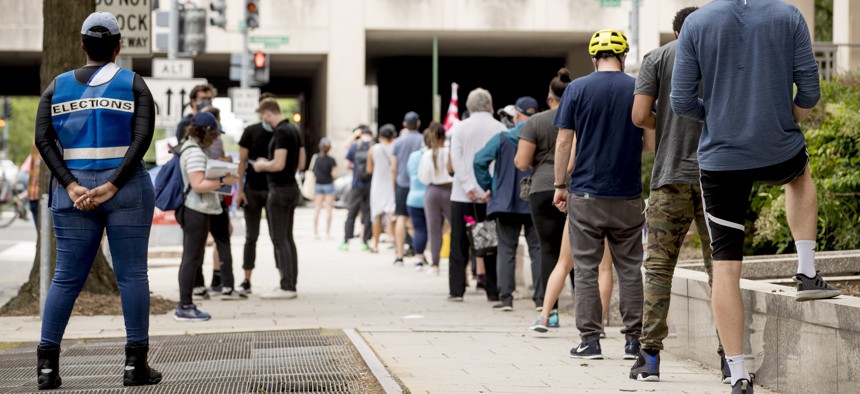Connecting state and local government leaders
A report by Democrats on the House Select Subcommittee on the Coronavirus Crisis analyzed the election preparations of four states and warned that a failure to recruit enough poll workers will lead to long wait times on Election Day.
States risk not having enough poll workers on Election Day if they do not step up efforts to help local election officials recruit and prepare for the November presidential election, a new congressional report warns.
The House Select Subcommittee on the Coronavirus Crisis analyzed the election preparations of four states—Florida, Georgia, Texas and Wisconsin—and found they all face a potential shortage of these crucial temporary workers, which could lead to significant delays for voters who cast ballots in person.
Georgia needs 20,000 poll workers for the election season, but the state had identified only 5,000 possible candidates, according to the staff report, released Wednesday by committee Democrats. One county, Dougherty County, reported that while it planned to have 196 poll workers on Election Day, it had identified only 29 people who were ready to serve.
The state appears to have drummed up additional interest in the time since the committee received information about recruitment efforts, as news reports out Wednesday indicate officials are saying 14,600 people have signed up as poll workers. In-person voting may be particularly important in Georgia on Election Day, as the state is not sending absentee ballots applications to voters for the general election the same way it did for the primaries this year.
The other three states did not identify the total number of poll workers needed statewide. The report faults them for not overseeing statewide recruitment efforts and instead leaving preparations up to local officials.
“With just two months left before the general election, states cannot simply defer to local election officials to address these problems,” states the report. “Instead, states should move swiftly and proactively to implement CDC recommendations and ensure a free, fair, and safe election.”
In Texas, which has not expanded vote-by-mail options amid the pandemic, documents obtained by the committee indicate there could be a poll worker shortage in half of the state’s counties. The Texas Secretary of State asked county officials in a recent survey whether election judges and clerks that normally work elections had indicated that they would not work for future elections. Of 254 county election officials, 127 indicated at least some of their typical workers would not be available.
An uptick in coronavirus cases in Texas over the summer, coupled with recent election guidance indicating that poll workers cannot require voters to wear masks inside polling places could lead other workers to drop out, the report states.
“It is crucial Texas take steps now to recruit poll workers rather than closing polling places and reducing hours,” said Select Subcommittee Chairman Rep. James Clyburn, who led a hearing on election preparedness on Wednesday.
The staff report has also raised the alarm about the potential for poll worker shortages in Florida and Wisconsin, finding that in Florida, state officials “have not developed statewide projections of voter turnout, absentee ballots, or poll workers needed.”
Wisconsin has estimated that it needs 30,000 poll workers for the general election, but the report found that because the state does not have a system in place to collect statewide recruiting data it is unclear whether it will have a sufficient number of poll workers.
Testifying at Wednesday’s hearing, voting rights experts said it is important to ensure voters’ ballot access is protected regardless of whether they choose to vote by mail or in person.
Kristen Clarke, the president and executive director of the Lawyers’ Committee for Civil Rights Under Law, said streamlining the process to obtain an absentee ballot, expanding early voting options so voters can cast ballots up to two weeks ahead of time, and properly staffing polling places so voters are not subject to long lines are all important steps for election officials to take.
Rather than rely on the expansion of absentee voting, some states are doubling down on efforts to improve in-person voting amid the pandemic.
Missouri Secretary of State Jay Ashcroft told lawmakers at the hearing that he will continue to encourage voters to cast their ballots in person, citing concern about the collection and counting of absentee ballots.
“It’s not a perfect system. What we see in Missouri and nationally is that in every election, at least 2 to 3% of ballots received by mail are rejected,” Ashcroft said.
Ballots could be disqualified for a litany of reasons, Ashcroft said, including an incorrectly completed envelope, a signature that doesn’t match voter records, or an incorrect ballot scan.
To support in-person voting, Ashcroft said Missouri has adopted other measures. The state used federal coronavirus funding to provide grants to local election officials so they could take whatever action they believed was needed to prepare. Missouri has also increased the number and size of some polling places, embraced curbside and drive through voting options as well, Ashcroft told the committee.
Andrea Noble is a staff correspondent with Route Fifty.

NEXT STORY: America Is Trapped in a Pandemic Spiral



